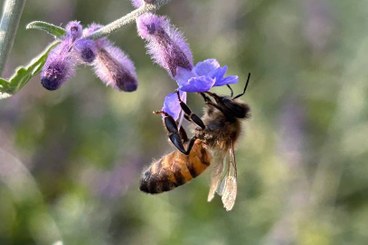
POLYPOLL
An interdisciplinary approach to unravel the effects of combined exposure to chemical pollutants on insect pollinators.

Pollinating insects play a fundamental role in crop pollination, ensuring agricultural production. However, their populations are subject to severe declines, partly due to exposure to pesticides and other chemical pollutants.
While ecotoxicological research has mainly focused on insecticides, other categories of plant protection products and environmental contaminants, such as fungicides, herbicides, heavy metals, and veterinary drugs, have received less attention.
The POLYPOLL project aims to fill this research gap by investigating the combined effects of various chemical contaminants on three different species of pollinating insects: the honeybee (Apis mellifera), a solitary bee (Osmia bicornis), and a hoverfly (Eristalis tenax). Specific objectives include assessing the synergistic effect of the tested chemical mixtures, analyzing impacts on survival, intestinal microbiome, and potential sublethal toxicological effects, as well as identifying key biomarkers and developing statistical interpretative models.
Through multi-biochemical analysis and cellular biomarkers, POLYPOLL aims to provide a comprehensive understanding of the molecular mechanisms involved in pollinators' response to chemical stresses and to develop tools for early assessment of their health. Additionally, the project aims to enhance understanding of the role of the intestinal microbiome in pollinators and the influence of chemical pollutants on it.
In summary, POLYPOLL aims to provide a solid scientific basis for a more comprehensive and accurate environmental risk assessment, thus contributing to making agricultural ecosystems more sustainable and favorable to pollinators.